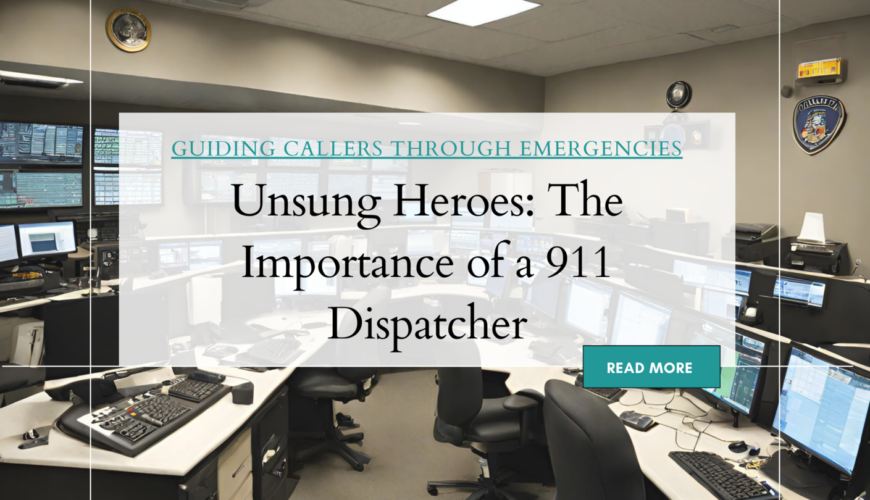Ever been stuck in a scary situation, not knowing what to do? It’s terrifying, right? That is where emergency dispatchers come in.
In those heart-stopping moments, there’s one lifeline we reach out for – dialing 911. But who answers that call?
Imagine being the human link between panic and peace of mind, chaos and control. This is the everyday reality of a 911 dispatcher who work within public safety.
We’re diving into their world – where seconds count like hours and every decision can be life-altering. We’ll explore how they handle calls with grace under pressure, guiding callers through emergencies while coordinating response teams on the ground using effective communication.
This isn’t just another day at work; it’s making sure help arrives when it matters most. Buckle up! You’re about to appreciate this critical role like never before…
Table Of Contents:
- The Role of a 911 Dispatcher
- The Dispatch Process Explained
- Emotional Challenges Faced by 911 Dispatchers
- Guiding Callers Through Emergencies
- Ensuring Round-the-Clock Coverage
- FAQs in Relation to The Importance of a 911 Dispatcher
- Conclusion
The Role of a 911 Dispatcher
When emergencies arise, the role of a 911 dispatcher becomes critical. Acting as lifelines in dire situations, they bridge the gap between those in distress and emergency services.
The Vital Link between Callers and Emergency Responders
In Omaha, Nebraska alone there are around 200 dedicated dispatch operators. Each juggles an average of 260 to 270 calls daily. That’s like managing a small city’s worth of crises every day. Just think of the communication skills needed to juggle those calls.
Being able to accurately assess each situation is crucial for these unsung heroes. They need to get information quickly, understand what kind of help is needed and ensure that aid arrives promptly.
Making sense out of chaos isn’t easy but their experience makes it possible – just like how seasoned chefs can tell if something’s burning even with multiple pots on the stove. This invaluable skill helps them make quick decisions when seconds count.
The Dispatch Process Explained
Understanding the dispatch process starts with knowing how a 911 dispatcher works. These professionals act as crucial links, receiving emergency calls and coordinating an effective response for emergency situations.
Quick Assessment and Response Coordination
A call to 911 sets off a rapid-fire sequence of events. As callers describe their emergencies, operators type this information into the system. This is not just idle chat; it’s data collection in real-time that lets them determine who needs to respond – firefighters, medical assistants or police officers.
Incredibly, this quick assessment can result in problem resolution within mere seconds. Yes, you read that right. Calls can be handled in a flash, taking no more than thirty seconds to one minute.
Locating Available Officers for Dispatch
Moving from decision-making to action-taking involves finding available responders based on geographical assignment and proximity to the incident. This isn’t about picking any responder but choosing one closest to ensure help arrives swiftly.
This aspect of coordination ensures efficient use of resources while minimizing response time—a life-saving combo if there ever was one.
Emotional Challenges Faced by 911 Dispatchers
The task of a 911 dispatcher can be emotionally taxing, as well as gratifying. Each call they receive carries with it the weight of someone’s worst day, and operators must maintain calm amidst chaos to get help where it’s needed.
This emotional toll isn’t something taken lightly in the industry. Many dispatch centers have recognized these challenges and offer psychological support services for their teams. This can range from group therapy sessions to individual counseling.
In fact, according to an NIH study, mental health resources are not just appreciated but often necessary given the high stress nature of this work.
Guiding Callers Through Emergencies
911 operators are the calming voice in the storm, providing crucial guidance to callers during emergencies. It’s as if a comforting hand were being extended through the phone, providing direction in an unfamiliar and frightening place.
Their role is more than just dispatching help; they often stay on line with distressed callers until help arrives and must remain calm throughout the entire process. They guide frightened and panicked individuals through life-saving procedures – whether it’s instructing someone how to perform CPR or guiding another through an evacuation due to fire.
In certain situations, staying connected becomes even more critical. Let’s consider this scenario: A child calls 911 because their parent has collapsed. The operator must not only send paramedics but also comfort and reassure that scared child while guiding them through potential first aid measures.
Studies show, when these unseen heroes keep callers on the line, chances for positive outcomes increase significantly.
Ensuring Round-the-Clock Coverage
911 dispatchers and operators are the unsung heroes who work tirelessly behind the scenes. They guarantee that support is accessible whenever, day in and day out, with only a telephone call away.
To achieve this feat of non-stop service, these professionals follow eight-hour shift patterns. This system ensures there’s never any downtime when it comes to emergency response services. But while maintaining round-the-clock coverage may sound simple in theory, its execution demands dedication and commitment.
The critical role they play means that every minute counts – literally. Two-thirds of dispatchers, primarily in local government and public safety agencies such as police and fire departments, are tasked with providing round-the-clock coverage that requires dedication and commitment.
This profession isn’t for everyone; it needs individuals with an extraordinary level of patience and mental fortitude. It requires being prepared for anything at any time because emergencies don’t stick to regular business hours.
FAQs in Relation to The Importance of a 911 Dispatcher
How important are dispatchers?
Dispatchers play a crucial role in emergencies. They’re the lifeline, connecting people who need help to first responders.
What makes a great dispatcher?
A top-notch dispatcher stays calm under pressure, has sharp problem-solving skills, and excels at clear communication.
Why are dispatchers so important when it comes to emergency response?
Dispatchers assess situations quickly and coordinate effective responses. They’re key for guiding callers through crises until help arrives.
Which skill is the most important for 911 dispatcher operator?
The ability to stay cool-headed during high-stress scenarios is paramount for a 911 dispatcher operator’s success.
Conclusion
Every tick of the clock is a testament to the importance of a 911 dispatcher. These unsung heroes handle emergencies with grace under pressure, turning panic into peace.
Their role isn’t just answering calls; they assess situations swiftly and coordinate effective responses. They’re that vital link between you and help during crises.
It’s not a cinch; it takes guts to stay composed in the face of tough circumstances and keep on helping people out even after hours. It takes emotional strength to guide callers through harrowing times while keeping cool themselves.
And don’t forget – their commitment doesn’t stop at sundown! With round-the-clock coverage, rest assured there’s always someone ready to lend a helping hand when you need it most!
The world feels safer knowing we have such dedicated individuals at our beck and call. Here’s celebrating them!


